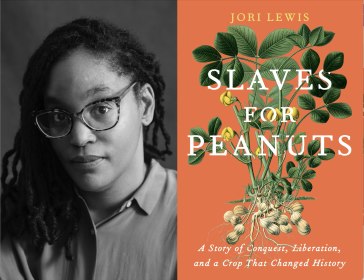
Award-winning author, journalist, and Metcalf Institute alumna Jori Lewis illustrates the tie between colonialism and environmental injustice in her recently released book, Slaves for Peanuts. With a background in environmental reporting, Lewis weaves historical narratives that take readers along for the ride. In this new book, she explores the environmental theme of land exploitation through the integrated histories of colonialism and capitalism.
Watch a discussion about Jori’s book with fellow Metcalf alum, Moises Velasquez-Manoff.
Slaves for Peanuts interweaves three stories. Lewis starts in Senegal, where she has lived for a decade. The first narrative follows the botanical journey of the peanut from South America to the Kajoor Kingdom in Senegal and eventually to New England through trade. In the second narrative, Lewis continues the story with a more in-depth look at Kajoor and discusses colonialism and the use of enslaved laborers in the kingdom’s peanut trade. The third narrative focuses on Walter Taylor, a Sierra Leonean missionary who establishes a shelter for runaway slaves in Saint Louis, Senegal. Taylor first comes to Senegal to work as an accountant for a New England shipmaster who transports peanuts back to New England cities. These stories come together as readers learn how Senegalese people altered their cultivation habits to make way for the peanut, only to run into a quality control problem driven by their agricultural practices. “The problem ultimately had a simple answer, but it was a huge mystery throughout the late 19th century,” she says in reference to the controversy around the peanut crop.
“The peanut quality was degrading and they didn’t know why. The reason was they were supporting this crazy monoculture and not renewing it in any way,” she explains. “The economic logic of the need for the peanut pushed aside all rational sense of how to use the land.”
Lewis attended the University of Chicago where she earned a bachelor’s degree in anthropology with a focus on the culture of the French Caribbean. She then completed the university’s Master of Arts in Social Sciences program. Lewis acknowledges that anthropology is built on colonial goals and methods, but she also says it’s a very useful area of study.
“There are a lot of things to not like about anthropology, but it offers such good tools for research because observation is really key,” she says.
These “tools” have been useful in Lewis’ career and fit perfectly with her second master’s degree in journalism from the University of California, Berkeley.
She was then accepted into the 2006-2007 cohort for Metcalf’s Environmental Reporting Fellowship, which at the time was known as the Diversity Fellowship in Environmental Reporting.
“The Metcalf fellowship was really ideal for me,” she recalls. “I had just come out of [journalism] school and it was really an amazing opportunity.”
The fellowship included a month-long intensive in which attendees came together at the URI Graduate School of Oceanography in Narragansett, Rhode Island, and learned about a range of environmental science research questions and methods. Hailing from Springfield, Illinois, Lewis enjoyed the experience of living in New England. This opportunity helped her understand the Northeast where Walter Taylor’s employers had a brisk trade in peanuts for a time.
As a Metcalf Fellow, Lewis was matched with PRI’s The World in Boston, under the instruction of then-editor and former Metcalf Institute Advisory Board chair, David Baron. The World is a public radio and podcast program that shares international stories with an American audience. She reported stories with The World for nine months under the auspices of the Metcalf Fellowship and then continued freelancing for the program for several years.
After the long process of researching and writing this book, Lewis is excited for readers to check out Slaves for Peanuts and learn how colonialism affected the peanut and a kingdom.
Looking back on her experiences, Lewis says that she highly recommends a Metcalf fellowship to anyone interested in environmental journalism.
As she says and demonstrates in her new book, “the environment touches everything.”
This feature was written by Sarah Schechter, a graduate student in the URI Master’s of Environmental Science & Management program with a concentration in Environmental Communication. Sarah is a URI College of the Environment & Life Sciences Communication Fellow.

